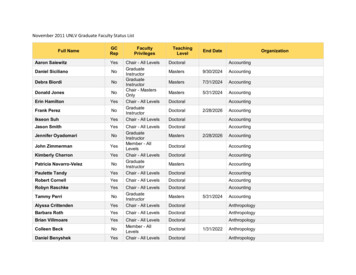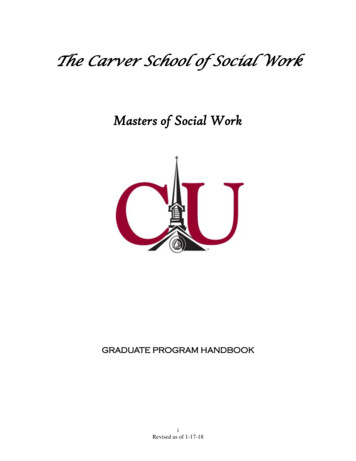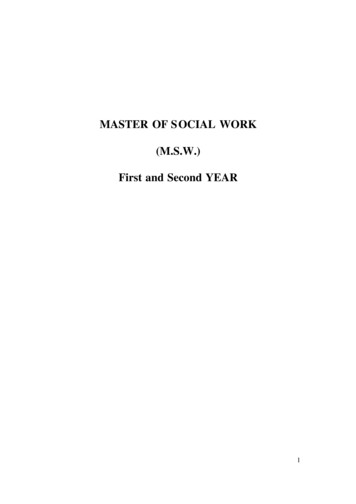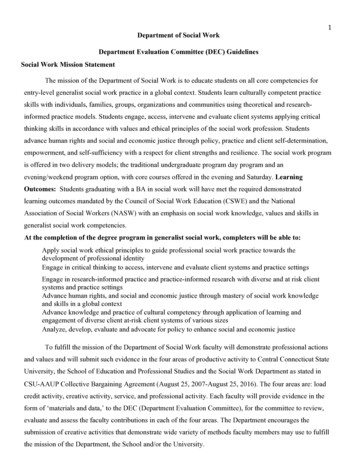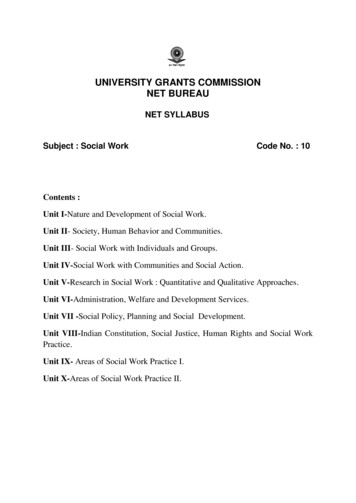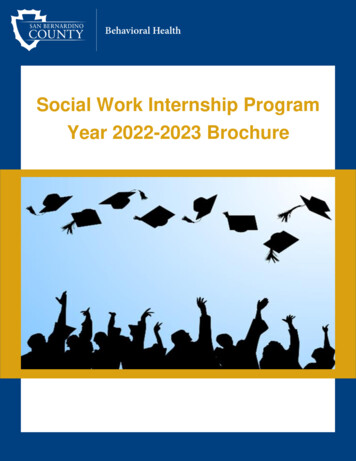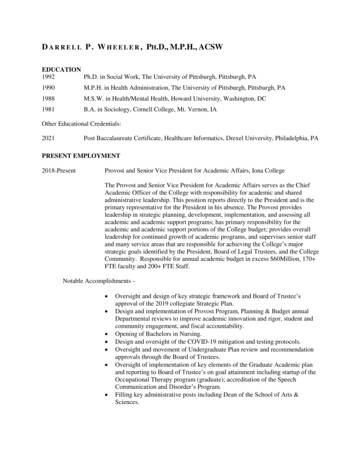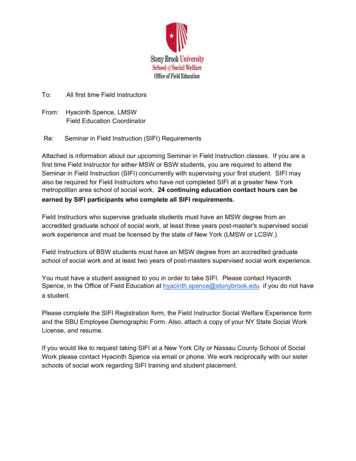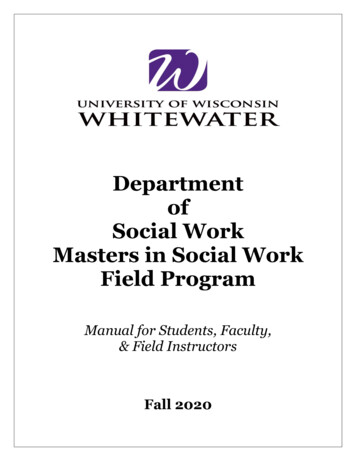
Transcription
DepartmentofSocial WorkMasters in Social WorkField ProgramManual for Students, Faculty,& Field InstructorsFall 2020
FORWARDThis manual is a guideline for graduate social work field placements. The purpose of the manual is to:(a) provide an orientation for students, agency Field Instructors, and new faculty to the structure andmechanics of field placementsAND(b) outline the policies and procedures of participating field placement agencies and the social work facultyrelative to their role, responsibility, and expectations in providing an educationally productive fieldexperience for graduate social work students.The social work faculty wishes to emphasize that suggestions for revision to this manual are welcome.A copy of this manual can be downloaded from the University of Wisconsin-Whitewater Department of SocialWork website found at: http://www.uww.edu/cls/social-workSOCIAL WORK FACULTY CONTACT INFORMATIONFacultyOffice PhoneJennifer AndersonKatherine Drechsler, Field CoordinatorSarah Hessenauer, Program CoordinatorAruna JhaYeongmin KimKristen ProckTim ReutebuchJeannine RoweSocial Work Main Office (LT 5201)(262) 472-7390(262) 472-5272(262) 472-1203(262) 472-5304(262) 472-1212(262) 472-5150(262) 472-1478(262) 472-1162(262) RODUCTIONThe Department of Social Work at the University of Wisconsin-Whitewater (UWW) offers a Master Degreein Social Work (MSW). The program is accredited by the Council on Social Work Education (CSWE). TheUWW Social Work program abides by the educational policy and accreditation standards (EPAS) set forth byCSWE1.The goal of graduate social work education is to prepare social work masters students, upon graduation, tofulfill the responsibilities of beginning, advanced generalist level practice social work positions. In meetingthis objective, quality field placement experiences are an essential part of social work preparation. The fieldplacement is designed to provide students an opportunity to learn within an agency setting, and to employthe knowledge, skills, and values acquired through their course work.Graduate social work education is considered a professional educational program and as such, fieldeducation is the capstone experience for students in the social work program at UW-Whitewater. FieldCSWE website and EPAS can be found at: xMSW Social Work Field Experience Manual
education is an integral component of social work education and as such it is anchored in the mission, goals,and the program competencies. It is the point where students must demonstrate successful integration ofacademic content with the demands of the work environment. Under the supervision of experiencedpractitioners, students must demonstrate their ability to meet the specific competencies of the practicum aswell as the expectations of agency, school, and profession.MISSION STATEMENT OF THE SOCIAL WORK DEPARTMENTTo cultivate advanced generalist social work professionals skilled in developing collaborative relationshipswithin dynamic regional and national contexts to address diverse human and community issues that affectwell-being.MISSION STATEMENT GOALS1. Preparing students through coursework and advising to advance their knowledge, develop strongprofessional values and ethics, and be able to apply a range of prevention and intervention methods.2. Engaging students in evidence-informed practices.3. Partnering students within a framework of community engagement to accomplish mutual goals.4. Providing students with opportunities to work in partnership with faculty who are actively engagedin practice, service, and research.MSW Social Work Field Experience Manual
SPECIFIED COMPETENCIES OF OUR EDUCATIONAL PROGRAMIn accordance with CSWE, graduates of our social work program will be able to demonstrate the followingcompetencies:Competency 1: Demonstrate Ethical and Professional Behavior1.1 make ethical decisions by applying the standards of the NASW Code of Ethics, relevant laws andregulations, models for ethical decision-making, ethical conduct of research, and additional codes ofethics as appropriate to context1.2 use reflection and self-regulation to manage personal values and maintain professionalism in practicesituations1.3 demonstrate professional demeanor in behavior; appearance; and oral, written, and electroniccommunication1.4 use technology ethically and appropriately to facilitate practice outcomes1.5 use supervision and consultation to guide professional judgment and behaviorCompetency 2: Engage Diversity and Difference in Practice2.1 apply and communicate understanding of the importance of diversity and difference in shaping lifeexperiences in practice at the micro, mezzo, and macro levels2.2 present themselves as learners and engage clients and constituencies as experts of their ownexperiences2.3 apply self-awareness and self-regulation to manage the influence of personal biases and values inworking with diverse clients and constituenciesCompetency 3: Advance Human Rights and Social, Economic, and Environmental Justice3.1 apply their understanding of social, economic, and environmental justice to advocate for human rightsat the individual and system levels3.2 engage in practices that advance social, economic, and environmental justice.Competency 4: Engage In Practice-informed Research and Research-informed Practice4.1 use practice experience and theory to inform scientific inquiry and research4.2 apply critical thinking to engage in analysis of quantitative and qualitative research methods andresearch findings4.3 use and translate research evidence to inform and improve practice, policy, and service delivery.Competency 5: Engage in Policy Practice5.1 identify social policy at the local, state, and federal level that impacts well-being, service delivery, andaccess to social services5.2 assess how social welfare and economic policies impact the delivery of and access to social services5.3 apply critical thinking to analyze, formulate, and advocate for policies that advance human rights andsocial, economic, and environmental justice.Competency 6: Engage with Individuals, Families, Groups, Organizations, and Communities6.1 apply knowledge of human behavior and the social environment, person-in-environment, and othermultidisciplinary theoretical frameworks to engage with clients and constituencies6.2 use empathy, reflection, and interpersonal skills to effectively engage diverse clients andconstituencies.MSW Social Work Field Experience Manual
Competency 7: Assess Individuals, Families, Groups, Organizations, and Communities7.1 collect and organize data, and apply critical thinking to interpret information from clients andconstituencies7.2 apply knowledge of human behavior and the social environment, person-in-environment, and othermultidisciplinary theoretical frameworks in the analysis of assessment data from clients andconstituencies7.3 develop mutually agreed-on intervention goals and objectives based on the critical assessment ofstrengths, needs, and challenges within clients and constituencies7.4 select appropriate intervention strategies based on the assessment, research knowledge, and valuesand preferences of clients and constituenciesCompetency 8: Intervene with Individuals, Families, Groups, Organizations, and Communities8.1 critically choose and implement interventions to achieve practice goals and enhance capacities ofclients and constituencies8.2 apply knowledge of human behavior and the social environment, person-in-environment, and othermultidisciplinary theoretical frameworks in interventions with clients and constituencies8.3 use inter-professional collaboration as appropriate to achieve beneficial practice outcomes8.4 negotiate, mediate, and advocate with and on behalf of diverse clients and constituencies8.5 facilitate effective transitions and endings that advance mutually agreed-on goals.Competency 9: Evaluate Practice with Individuals, Families, Groups, Organizations, andCommunities9.1 select and use appropriate methods for evaluation of outcomes9.2 apply knowledge of human behavior and the social environment, person-in-environment, and othermultidisciplinary theoretical frameworks in the evaluation of outcomes9.3 critically analyze, monitor, and evaluate intervention and program processes and outcomes9.4 apply evaluation findings to improve practice effectiveness at the micro, mezzo, and macro levels.MSW Social Work Field Experience Manual
COURSE REQUIREMENTS IN SOCIAL WORKLIBERAL ARTS BACKGROUND AND PREREQUISITE COURSESDemonstration of 24 hours of liberal studies courses, including: Courses in social sciences (psychology, sociology, anthropology, economics, women’s studies,political science) Course(s) in human biologySOCWORK 102: Introduction to Social Work: (3 credits).SOCWORK 250: Statistics for Social Work:REQUIRED SOCIAL WORK COURSESNON-ADVANCED STANDING/TRADITIONAL STUDENTS MUST COMPLETE THE FOLLOWING CORE COURSES:SOCWOR 511: Human Behavior and the Social Environment (4 credits)SOCWOR 662: Social Welfare Policy (3 credits)SOCWORK 571: Social Work Practice I (3 credits)SOCWORK 572: Social Work Practice II (3 credits)SOCWORK 573: Social Work Practice III (3 credits)SOCWORK 602: Social Work Research (4 credits)SOCWORK 712: Social Work Psychopathology (3 credits)SOCWORK 720: Advanced Social Welfare Policy Analysis (3 credits)SOCWORK 733: Social Work Practice with Groups, Communities, and Organizations (3 credits)SOCWORK 771: Research Program Implementation and Evaluation. (3 credits)SOCWORK 776: Advanced Practice: Intervention and Evaluation. (3 credits)SOCWORK 783: Social Work Field Experience (3-4 credits)SOCWORK 784: Social Work Field Research Integration Capstone (3 credits)ADVANCED STANDING/ADVANCED GENERALIZATION SPECIALIZATION STUDENTS MUST COMPLETE THE FOLLOWINGCORE COURSES: (STUDENTS WHO HAVE GRADUATED FROM A CSWE ACCREDITED UNDERGRADUATE SOCIAL WORKPROGRAM WITH A B OR BETTER IN CORE SOCIAL WORK COURSES)SOCWORK 712: Social Work Psychopathology (3 credits)SOCWORK 720: Advanced Social Welfare Policy Analysis (3 credits)SOCWORK 733: Social Work Practice with Groups, Communities, and Organizations (3 credits)SOCWORK 771: Research Program Implementation and Evaluation. (3 credits)SOCWORK 776: Advanced Practice: Intervention and Evaluation. (3 credits)SOCWORK 783: Social Work Field Experience (3-4 credits)SOCWORK 784: Social Work Field Research Integration Capstone (3 credits)MSW Social Work Field Experience Manual
REQUIRED SOCIAL WORK COURSE DESCRIPTIONSNON-ADVANCED STANDING/TRADITIONAL STUDENTS COURSES:SOCWORK 511: HUMAN BEHAVIOR AND THE SOCIAL ENVIRONMENT (4 CREDITS).This course is designed to provide students with an understanding of the processes of bio-psychoand socio-cultural development from infancy to young adulthood. Material is also presented on thesocial systems (families, groups, organizations, and communities) in which individuals live.SOCWORK 662: SOCIAL WELFARE POLICY (3 CREDITS).This course is designed to provide students with knowledge about the process of social welfare policyformulation and implementation and with policy analysis skills. The effects of social welfare policiesand organizations on both clients (especially the poor and minorities) and on social workers will beemphasized.SOCWORK 571: SOCIAL WORK PRACTICE I (3 CREDITS).This course presents advanced contemporary theoretical approaches to social work practice withindividuals, groups, families, organizations and communities. This course uses a competencyapproach to assess and develop student interviewing and interpersonal skills, emphasizing socialwork practice with individuals.SOCWORK 572: SOCIAL WORK PRACTICE II (3 CREDITS).This is the second of three required social work practice courses. This course is designed to helpstudents build upon the skills and knowledge required in Practice I, including further developmentof interviewing and interpersonal skills. In particular, the emphasis of this course includes studyingthe dynamics of groups and working with various types of groups.SOCWORK 573: SOCIAL WORK PRACTICE III (3 CREDITS).This course is designed to further develop and fine tune advanced generalist social work skills at alllevels of intervention (including individuals, families, organizations, and communities). Coursecontent will focus on difficult situations in micro practice, understanding and working with families,and working in and with organizations and communities.SOCWORK 602: SOCIAL WORK RESEARCH (4 CREDITS).This course is designed to familiarize the student with basic concepts of social work researchmethodology and statistics, computer usage, to develop competence in evaluating research literatureand to develop advanced skills in evaluating social work practice.ADVANCED STANDING/ADVANCED GENERALIST SPECIALIZATION CORE COURSES:SOCWORK 712: SOCIAL WORK PSYCHOPATHOLOGY (3 CREDITS).This course takes a closer examination of psychopathology which affects how clients function, andexplores the role of diversity. Students learn to use the DSM-5, which is implemented in social workinternship experiences.SOCWORK 720: ADVANCED SOCIAL WELFARE POLICY ANALYSIS (3 CREDITS).Students will learn to plan for, develop, implement, and evaluate social welfare policies and programsrelevant to social justice, critically examining social work policies on a global level andcompare/contrast with United States policies.SOCWORK 733: SOCIAL WORK PRACTICE WITH GROUPS, COMMUNITIES, AND ORGANIZATIONS (3 CREDITS).This class builds on graduate classes by further examining the impact of the community as a majorelement that influences an individual and/or system. The course also includes theories and methodsMSW Social Work Field Experience Manual
of working with groups and communities, including methods of change, advocacy, planning, respectfor diversity, and understanding social justice.SOCWORK 771: RESEARCH PROGRAM IMPLEMENTATION AND EVALUATION. (3 CREDITS).Students will utilize practice experience and theory to inform research. Students will examinequantitative and qualitative research designs, applying critical thinking skills to analyze research.Students will develop an ethical plan, design, and conduct one evaluative study of anintervention/program which will be concluded in Research Integrative Capstone project.SOCWORK 776: ADVANCED PRACTICE: INTERVENTION AND EVALUATION. (3 CREDITS).This class teaches students to assess clients and implement culturally competent, evidence-basedinterventions to enhance clients' lives. This course presents advanced methods involved incompletion of assessments, practice interventions, therapeutic processes, and evaluation. Pullingfrom examples from field placement experience, students will be required to select appropriateinterventions for clients.SOCWORK 783: SOCIAL WORK FIELD EXPERIENCE (3-4 CREDITS).Repeatable, depending on status. Students complete this first field practicum course under thesupervision of an approved agency field instructor and academic guidance of a faculty field liaison.SOCWORK 784: SOCIAL WORK FIELD RESEARCH INTEGRATION CAPSTONE (3 CREDITS).The course continues an advanced practicum experience. Students will be required to implementtheir research project in this field experience and create a portfolio based on the coursework and thefinal research project.ELECTIVE COURSES:COUNSED 746 COUNSELING AND THE CHEMICAL DEPENDENCY PROCESS (3 CREDITS).This course is a study of alcohol and other drug abuse, the process of chemical dependency, its impacton the family and its importance in the area of counseling. This course will enable the counselor toidentify and assess the substance abuser and examine the counselor's role in the prevention andintervention process. Students will develop knowledge of the behavioral, psychological, physicalhealth, and social effects of psychoactive substances and addictive disorders on the user andsignificant others. It will examine the history, philosophy and trends in addiction counseling. Thestudent will learn to identify the various symptoms of progressive stages of chemical dependencyand counseling modalities for treatment.SOCWORK 741: TREATMENT OF SUBSTANCE USE AND OTHER ADDICTIVE DISORDERS (3 CREDITS).Social, legal, political, psychological, biological (including neuroscience research), spiritual, andethical factors related to substance use disorders, eating disorders, and other behavioral addictionswill be examined. Assessment and intervention models with an emphasis on harm reduction, stagesof change, medication assisted treatment, and strengths perspective will be studied.SOCWORK 750: SOCIAL WORK WITH MILITARY (3 CREDITS).This course explores military culture and stressors associated with military lifestyle. Ethical issuesfor working in this environment are considered. Students completing this course will have a more indepth understanding of theory-based and research-informed strategies to work with the military,veterans and their families in a variety of settings.SOCWORK 752: ADVANCED INTERVENTION WITH MILITARY MEMBERS (3 CREDITS).Theoretical and practical approaches to advanced clinical practice with individuals in the military,military families, and groups. Examines the demands of military service on the family and studiesMSW Social Work Field Experience Manual
group dynamics, composition, and common social issues in the military system. Implementation ofappropriate treatment plans and interventions will be examined.SOCWORK 760: SOCIAL WORK WITH INDIVIDUALS WITH PHYSICAL DISABILITIES (3 CREDITS).The focus of this course will be on demystifying disability by examining the lived experiences ofpeople with physical disabilities. Students will explore disability from bio-psycho-social and culturalperspectives. They will gain knowledge of the disability community’s common language, norms ofconduct, economic concerns, political issues, and struggles with stigmatization.SOCWORK 762: SOCIAL WORK INTERVENTIONS WITH INDIVIDUALS WITH PHYSICAL DISABILITIES (3CREDITS).Theoretical and clinical approaches to working with individuals with a disability and families whohave a family member with a disability will be examined. Students will practice assessing,intervention, writing treatment plans, and evaluation in relation to physical disability cases in socialwork.MSW Social Work Field Experience Manual
SEQUENCING AND PREREQUISITES FOR SOCIAL WORK COURSESHUMAN BEHAVIOR AND THE SOCIAL ENVIRONMENTYou need (prerequisites):1.Introduction to Social Welfare and Social Work (SOCWORK102)2.Biological Foundations (BIOLOGY 120 or 140 or other department approved course)3.Undergraduate Social Work, Sociology or Psychology courseSOCIAL WORK PRACTICE 1You need:1.Human Behavior and the Social EnvironmentSOCIAL WORK PRACTICE 2You need:1.Social Work Practice 1SOCIAL WORK PRACTICE 3You need:1.Social Work Practice 1SOCIAL WORK RESEARCHYou need:1.Statistics (200 level or higher)SOCIAL WELFARE POLICYYou need:1.Undergraduate Political Science CourseSOCIAL WORK EXPERIENCEYou need:1.Approval of the departmentSOCIAL WORK PSYCHOPATHOLOGYYou need:1.Human Behavior and the Social EnvironmentADVANCED SOCIAL WELFARE POLICY ANALYSISYou need:1.Social Welfare PolicySOCIAL WORK PRACTICE WITH GROUPS, COMMUNITIES, AND ORGANIZATIONSYou need:1.Human Behavior and the Social Environment2.Social Work Practice 13.Social Work Practice 2RESEARCH AND PROGRAM IMPLEMENTATION AND EVALUATIONYou need:1.Social Work Psychopathology2.Social Work ResearchMSW Social Work Field Experience Manual
ADVANCED PRACTICE: INTERVENTION AND EVALUATIONYou need:1.Research and Program Implementation and EvaluationSOCIAL WORK FIELD RESEARCH INTEGRATION CAPSTONEYou need:1.Social Work Field Experience2.Social Work Research and Program Implementation and EvaluationSOCIAL WORK EXPERIENCEYou need:1.Admittance into the MSW program: completion of probationary coursework.2.Consent of Field Coordinator.OVERVIEW OF THE DESIGN OF THE SOCIAL WORK CURRICULUMThe Social Work Department notes that social work courses are built upon, and integrated with, theliberal arts content. In addition, the department emphasizes the interrelationships among human behavior,social policy, research, practice, and field placement content. The basic thrust of the curriculum is to preparestudents for advanced generalist practice. The social work program has adopted the following definition ofgeneralist social work practice:“Generalist practice is grounded in the liberal arts and the person in the environment framework. Topromote human and social well-being, generalist practitioners use a range of prevention and interventionmethods in their practice with diverse individuals, families, groups, organizations, and communities basedon scientific inquiry and best practices. The generalist practitioner identifies with the social work professionand applies ethical principles and critical thinking skills at the micro, mezzo, and macro levels. Generalistpractitioners engage diversity in their practice and advocate for human rights and social and economicjustice. They recognize, support, and build on the strengths and resiliency of all human beings. They engagein research-informed practice and are proactive in responding to the impact of context on professionalpractice” (CSWE, 2015). Generalist social work practice is guided by the NASW Code of Ethics and iscommitted to improving the well-being of individuals, families, groups, communities and organizations andfurthering the goals of social justice.In order to further this preparation for advanced generalist practice and provide the appropriateknowledge and skill base for social work, a specific curriculum has been developed. The curriculum iscomposed of several core areas and includes courses from the specialization area (generalist practicecourses), any areas of emphasis, and electives. The background for social work practice requires broadexposure to a number of liberal arts disciplines including political science, psychology, sociology, English,biology, and communication. The curriculum and supporting courses can be viewed as a total packagedesigned to produce the desired outcomes.The curriculum has been conceived as representing the core areas of Human Behavior in the SocialEnvironment, Social Work Practice, Research, Social Welfare Policy and Service, and electives. It is possibleto categorize most social work courses under one of these areas, although there is always overlap. Asimplified categorization of our courses in the areas indicated is as follows:HUMAN BEHAVIOR & SOCIAL ENVIRONMENTSOCWORK 511 Human Behavior & Social EnvironmentSOCWORK 712 Social Work PsychopathologyMSW Social Work Field Experience Manual
SOCIAL WORK PRACTICESOCWORK 571 Social Work PracticeSOCWORK 572 Social Work Practice IISOCWORK 573 Social Work Practice ThreeSOCWORK 712 Social Work PsychopathologySOCWORK 733 Social Work With Groups, Communities, And OrganizationsSOCIAL WELFARE POLICY & SERVICESSOCWORK 662 Social Welfare PolicySOCWORK 720 Advanced Social Welfare Policy AnalysisRESEARCHSOCWORK 602 Social Work ResearchSOCWORK 771 Research and Program Implementation and EvaluationSOCWORK 784 Social Work Field Research Integration CapstoneFIELD WORKSOCWORK 783 Social Work ExperienceSOCWORK 784 Social Work Field Research Integration CapstoneELECTIVE COURSES IN THE PROGRAMSOCWORK 501 Assertiveness Training in the Helping ProfessionsSOCWORK 537 Introduction to Social GerontologySOCWORK 541 Sexuality for Professional GrowthSOCWORK 575 Social Work Case ManagementSOCWORK 580 Race, Ethnicity, and Social Justice: Issues for Helping ProfessionalsCOUNSED 746 Counseling and the Chemical Dependency ProcessSOCWORK 741 Treatment of Substance Use and other Addictive DisordersSOCWORK 750 Social Work with MilitarySOCWORK 752 Advanced Intervention with Military Members and FamiliesSOCWORK 760 Social Work with Individuals with Physical DisabilitiesSOCWORK 762 Social Work Interventions with Individuals with Physical DisabilitiesSOCWORK 798 Independent Study in Social WorkAlthough this listing provides an abbreviated way of viewing the program, it is important to recognize thatpreparation for practice, by its very nature, requires an integration of curriculum content, somewhat blurringMSW Social Work Field Experience Manual
the distinction between areas. For example, the field experience portion of the curriculum is expected tointegrate all of the areas. For example, students might engage in one on one meetings with clients, leadgroups, provide education to families, evaluate agencies, learn agency policies, evaluate local/state/federalpolicies, etc. Ethical considerations are also applicable to all social work courses including research andsocial policy. Of course, research cannot be divided from theory or practice, and policy and practice arelikewise related. In addition, practice is dependent upon knowledge of human behavior in the social andphysical environment and so it goes. As you can see, the dividing lines are not as sharp as one might suppose.The advanced generalist social work practice knowledge that is learned in the classroom is connectedto the field experience in numerous ways. The Learning Agreement requires the field student to identifyobjectives and activities in the field experience related to each of the nine competencies in both the first andsecond year (advanced generalist specialization) years. In using the first competency Demonstrate Ethicaland Professional Behavior as an example, in the first year (non-specialization year) the student will beintroduced the NASW Code of Ethics and the concept of professionalism through course readings in SocialWork 511 Human Behavior in the Social Environment. They will also: present as a professional whilecompleting the legislative testimony project in Social Work 662 Social Welfare Policy, will practice beingprofessional in leading a group including professional appearance and demeanor in Social Work 572 Practicewith Groups and Families, and students will read materials and apply an ethical dilemma model to ethicaldilemma scenarios in Social Work 573 Practice with Communities and Organizations. The LearningAgreement connects this content to the field experience by having the field student identify an objective andactivities that will demonstrate that they understand the value base of the profession and its ethicalstandards. An example of an objective in the Learning Agreement would be that the field student woulddemonstrate knowledge of the NASW Code of Ethics and will review ethical dilemmas they are encounteringwith their Field Instructor. The activities that the student would engage in during their field experiencewould be reviewing the NASW Code of Ethics, understanding an ethical dilemma model, and be prepared todiscuss this during supervision with the Field Instructor. The student would be connecting the knowledgegained in the course curriculum to experiences they are having in their field experience. In the specializationyear, the learning agreement will focus on implementing research evaluation requiring them to completetheir classroom assignment of CITI training (Social Work 771: Research Program Implementation andEvaluation) so students may carry out ethical, independent research in field to complete their evaluationproject for their Social Work 784: Social Work Research Integration Capstone Course.Another way the advanced generalist knowledge that is learned in the classroom is connected to thefield experience is the Weekly Field Log. The Weekly Field Log is completed by the field student at all levelsin the program and is reviewed by the Faculty Field Liaison. The Weekly Field Log requires the field studentto discuss a synopsis of the week’s activities including discussing client diagnosis and treatment modalitiesused during the week, the social work roles performed, the application of practice, demonstrating learningby sharing topics they may need to research and improve their knowledge about the population they areworking with, what they would have done differently, and reflection on their self-care plan. In Social Work602, students write about a research proposal and build on this in Social Work 771: Research and ProgramImplementation where they are expected to complete an evidenced based intervention and assessing theeffectiveness of the intervention. This knowledge gained completing this assignment will enhance thestudent’s ability to apply an intervention in their field experience and evaluate outcomes of the intervention.There is a section in the field log where students write about what they learned each week and explore issuesrelated to research with clients and within the organization. This connection between the course content andthe field experience will be reflected in the Weekly Field Log.The Field Integration Assignments are part of the requirements for the field experience. The FieldIntegration Assignments connect the advanced generalist social work knowledge learned in the classroomto the field experience. One of the Field Integration Assignments has the student identify the different typesof diversity at their field placement and discuss how diversity is integrated into the work environment andhas the student complete an assessment on the cultural competency of the agency. In Social Work 573 SocialWork Practice with Communities and Organizations the students read a chapter titled “Advocacy and SocialAction with Populations at Risk” to learn ways to advocate for diverse population and in Social Work 720:MSW Social Work Field Experience Manual
Advanced Policy students read policies related to diverse societies, including gender, sexual orientation, raceand ethnicity in order to learn how to promote social justice and dev
in Social Work (MSW). The program is accredited by the Council on Social Work Education (CSWE). The UWW Social Work program abides by the educational policy and accreditation standards (EPAS) set forth by CSWE1. The goal of graduate social work education is to prepare social work masters students, upon graduation, to
